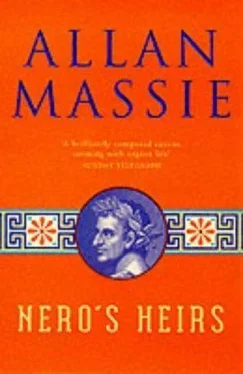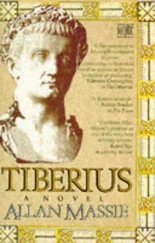Allan Massie - Nero_s Heirs
Здесь есть возможность читать онлайн «Allan Massie - Nero_s Heirs» весь текст электронной книги совершенно бесплатно (целиком полную версию без сокращений). В некоторых случаях можно слушать аудио, скачать через торрент в формате fb2 и присутствует краткое содержание. Жанр: Исторические приключения, на английском языке. Описание произведения, (предисловие) а так же отзывы посетителей доступны на портале библиотеки ЛибКат.
- Название:Nero_s Heirs
- Автор:
- Жанр:
- Год:неизвестен
- ISBN:нет данных
- Рейтинг книги:3 / 5. Голосов: 1
-
Избранное:Добавить в избранное
- Отзывы:
-
Ваша оценка:
- 60
- 1
- 2
- 3
- 4
- 5
Nero_s Heirs: краткое содержание, описание и аннотация
Предлагаем к чтению аннотацию, описание, краткое содержание или предисловие (зависит от того, что написал сам автор книги «Nero_s Heirs»). Если вы не нашли необходимую информацию о книге — напишите в комментариях, мы постараемся отыскать её.
Nero_s Heirs — читать онлайн бесплатно полную книгу (весь текст) целиком
Ниже представлен текст книги, разбитый по страницам. Система сохранения места последней прочитанной страницы, позволяет с удобством читать онлайн бесплатно книгу «Nero_s Heirs», без необходимости каждый раз заново искать на чём Вы остановились. Поставьте закладку, и сможете в любой момент перейти на страницу, на которой закончили чтение.
Интервал:
Закладка:
And the sun shone again in my own life also. I found Domatilla unhappy in her marriage, saddled with a husband for whom she felt neither affection nor respect. She was in the full flower of her beauty, but it was her new sad look that revived my old passion, and it was her misery which allowed me to persuade her to my bed. I knew, while Titus lived, what is surely the supreme joy granted a man: to be one with a woman who truly loves you. Now there is only the memory of her caresses to lighten the perpetual night of old age and exile. Then, in her arms, I felt for the only time in my life complete. I was able to forget the guilt of my association with that Empire which has destroyed liberty.
But, inevitably, as it seems, I served that Empire. I could see no alternative. I have argued this question, often, with Tacitus, who, even when Domitian made him a Praetor and Senator, dreamed of the Republic. He would not believe, or accept, what was to me evident: that the conditions which made the Republic possible no longer existed. They had indeed been long gone. The Republic, I insisted, had been destroyed, not by loss of virtue, as he supposed, though that might be the consequence of its destruction, but by the very success of the Republican armies in extending Rome's sway over distant lands and peoples.
Caesar was a product of the Republic, and his career was proof that it was dead. He had no need to murder it. You cannot kill a corpse. And when the self-styled Liberators made a corpse of Caesar himself, they could not breathe new life into their beloved Republic. Mark Antony knew this. Augustus saw it still more clearly. Tiberius, reluctantly, accepted the reality of Empire. It was clear to me that the horror of the year when Nero's heirs struggled for supremacy proved only this: that a strong Emperor, able to command the loyalty and obedience of the legions, was necessary. Vespasian proved such an Emperor. So, briefly, did Titus. Why should I condemn myself for acceding to the dictates of my reason and serving him?
Yet I am haunted by my casual remark to Balthus: we make a desert and call it peace. The desert is not physical, for Rome and the Empire prosper. It is moral. Balthus would have me believe it is what he calls 'spiritual'; but that has no meaning for me. Yet there may be something in what the boy says. I see, from a distance now, my fellow Romans seek significance in the service of the mystery cults of the East. Many of my soldiers devoted themselves to the worship of Mithras, God of Light and, they averred, Guardian of the Legions. I looked on with superior disdain. And I am left with nothing.
Titus died, suddenly. Officially he died of a fever, caught while on a journey to Sulmona, birthplace of the poet Ovid in whose Art of Love he had always delighted. He had been Emperor for only two years, not long enough to outlast his popularity.
In fact, Domitian murdered him. I have never doubted that, though ignorant of how the poison was administered.
Domitian had conspired against him since their father's death -previously also, I believe. Yet Titus always forgave him, and assured him of the love he felt for him as his brother and designated successor. Privately, he remarked to me, dismissing Domitian's latest clumsy plotting with associates of no account, 'Nobody will ever murder me to enable little Dom to wear the purple.' I warned him of Domitian's persistence. He paid no heed.
In truth, Domitian had nothing to resent but his consciousness of his own inferiority to his brother. This persisted even after Titus' death. He was furious when people talked admiringly of Titus, and when the Senators spoke of the late Emperor with even more enthusiasm than when he was alive.
A few days after his accession Domitian summoned me to the palace. I found him alone, paring his nails with a knife. He emphasised the change in our circumstances by declining to rise to greet me. We had been accustomed to embrace; I felt cold distance between us now. Even as Emperor, Titus had never failed to offer me his cheek when we met in private. Domitian sat at an angle to the window which gave on the valley of the Forum between the Palatine and the Capitol.
'I have a vision for Rome,' he said. 'There must be moral renewal. The court must set an example.'
Every Emperor, except Nero and Gaius Caligula, has, I suppose, commenced his reign with some such intention. Titus had even given up his troupe of dancing-boys; some of them had sufficient talent, charm and beauty to make a fortune on the public stage.
'I have ordered my brother's catamites to be rounded up and deported,' Domitian said, as if reading my mind. 'It would be absurd to think of restoring the Republic,' he said, 'but I shall re-establish Republican standards of virtue. I am told that some of the Vestal Virgins have broken their vows of chastity. So I have instituted an inquiry, and the guilty will be executed.'
He examined his nails, and apparently dissatisfied, nibbled at the middle finger of his right hand.
The practice,' he said, 'of making boys eunuchs revolts me. I am preparing an edict declaring that castration is a capital offence.
'Nothing,' he said, 'that the Divine Augustus achieved was more important than the reformation of morality. Don't you agree?' 'I'm aware that he attempted it. I'm not so sure of his success.'
'That schoolmaster – Democritos – who so abused us… I'm having him sought out. I haven't yet decided how to put him to death. Whipping? That would be appropriate. Would that please you?'
'It's a long time ago,' I said. 'He must be an old man now. What does it matter?'
'It matters to me.' He gave me a quick dark glance, and then looked away.
'You're an offender yourself,' he said. 'A criminal, an adulterer. You've been bedding my sister Domatilla. I won't have it. Under the Lex Julia, that decree of the Divine Augustus which prohibits adultery, you could be sent into exile, to a remote island and deprived of your fortune.'
'I have no fortune,' I said. You know that. We were always poorer than our fellow students. As for Domatilla, I don't deny the charge. Her marriage is wretched. She would like to divorce her husband and marry me.'
He turned on me, met my eyes, and looked away again. He tore with his thumbnail at the side of his index finger till spots of blood appeared. 'I forbid it. I forbid it absolutely. I forbid you to see Domatilla ever again. I forbid you to see her alone. If you disobey you shall feel the full penalty of the law. Do you understand?' I turned and, without seeking permission to depart, left him.
At home, I found a letter from Domatilla. Her brother had already spoken to her. She said we must obey; for my sake, she said. It would be death to me to defy Domitian's imperial command. She herself was retiring to Campania, to her husband's estates. That, too, was what Domitian had ordered.
XXXXI
I never saw Domatilla again. In my heart I reproached her for cowardice, told myself that I would have defied Domitian. So when later there were scurrilous rumours abroad, retailed to me by kind friends, rumours which told of how she and Domitian were locked in an incestuous pact, that he had been seen leaving her bedchamber, then in my bitterness, despite her earlier assurance that she had resisted his advances, I believed them. I was all too eager to believe them. I cursed the frailty and treachery of women, and refused to entertain the thought that she was the victim of slander and that she might, in rejecting me at her brother's command, have suffered even more than I, and had accepted her suffering for my sake, that I might still have a career in public life. So I nursed the viper of resentment in my bosom, and of all with which I have to reproach myself, nothing now seems more culpable than the silent reproaches which I directed for so many years at the only woman whom I ever truly loved, the only one who (I now believe) loved me as a man wishes to be loved.
Читать дальшеИнтервал:
Закладка:
Похожие книги на «Nero_s Heirs»
Представляем Вашему вниманию похожие книги на «Nero_s Heirs» списком для выбора. Мы отобрали схожую по названию и смыслу литературу в надежде предоставить читателям больше вариантов отыскать новые, интересные, ещё непрочитанные произведения.
Обсуждение, отзывы о книге «Nero_s Heirs» и просто собственные мнения читателей. Оставьте ваши комментарии, напишите, что Вы думаете о произведении, его смысле или главных героях. Укажите что конкретно понравилось, а что нет, и почему Вы так считаете.












